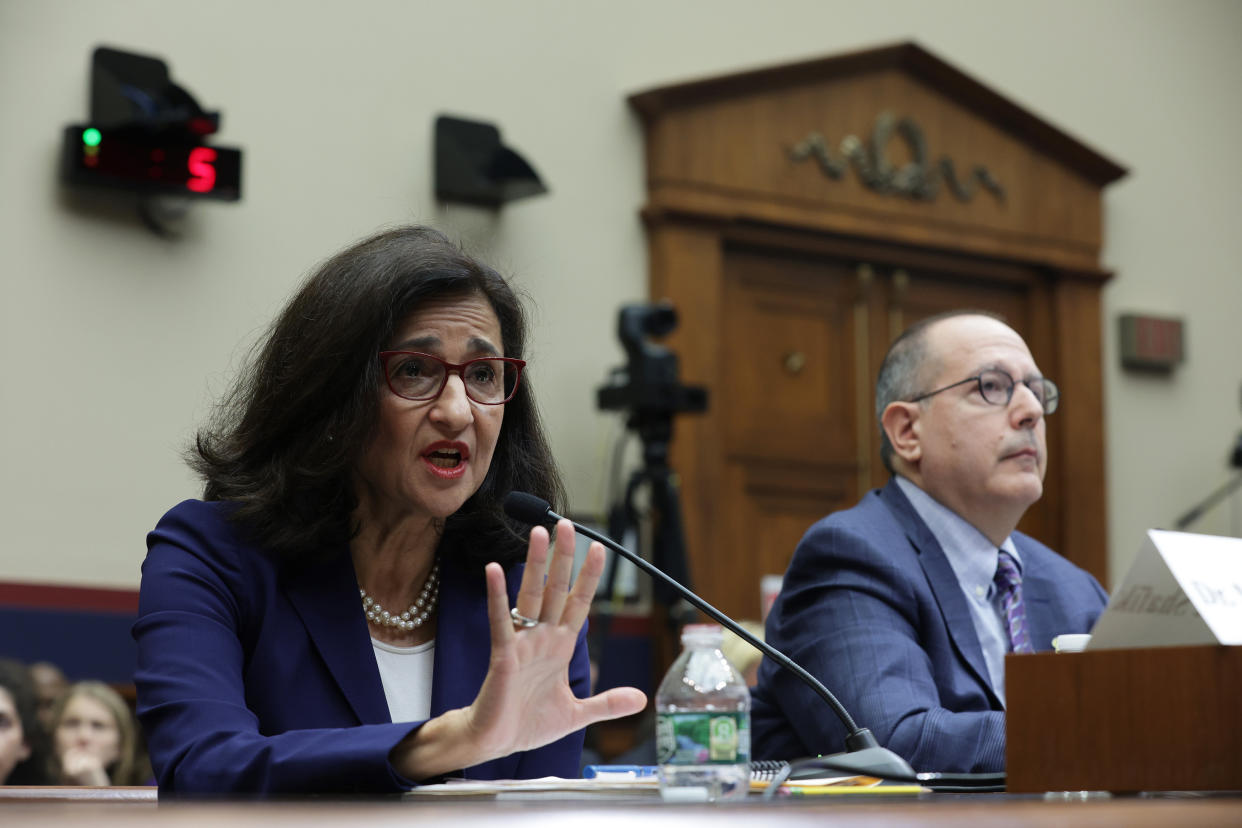After NYPD on-campus arrests, Columbia faculty group calls for no confidence vote on Shafik

NEW YORK — A faculty group at Columbia University on Thursday called for a vote of no confidence in Minouche Shafik, the newly minted university president whose tenure has been marred by campus protests and criticism of her use of the New York Police Department.
The campus chapter of the American Association of University Professors, a professional faculty organization, said the shared decision of the administration — including the Board of Trustees and other officials — to call police to clear pro-Gaza student protests was made without consulting the university Senate and violated procedures.
“The choice of Columbia’s administrators to ignore university statutes and customary practices honored over the past six decades, to have our students violently arrested, and to impose a militarized lockdown of our campus, has irrevocably undermined our trust in them,” the statement read.
The police raid Tuesday night resulted in the arrest of 109 protesters in and around campus, including dozens of protesters inside the occupied Hamilton Hall. Many students and faculty are barred from campus, which is only open to students living in a handful of dorms and essential services staff.
Much of the Columbia community was encouraged to leave campus early if they could rearrange their plans, as final exams and review sessions were moved online. Shafik has asked that NYPD stay on campus until a couple of days after graduation on May 15.
Shafik and other Columbia officials, backed by Mayor Eric Adams and the Police Department, have defended the decision to bring in cops in riot gear as lamentable but necessary.
“Over the last few months, we have been patient in tolerating unauthorized demonstrations, including the encampment,” Shafik said in a statement Wednesday, adding she decided to ask police to intervene “because my first responsibility is safety.”
“It is going to take time to heal, but I know we can do that together,” she continued.
University officials cautioned the AAUP does not represent all faculty at Columbia.
“President Shafik continues to regularly consult with members of the community, including faculty, administration, and trustees, as well as with state, city and community leaders,” said a Columbia spokesman. “She appreciates the efforts of those working alongside her on the long road ahead to heal our community.”
The faculty group first announced it “lost confidence” in the administration on April 19, after the first sweep of the encampment when cops arrested 113 protesters.
But after House Speaker Mike Johnson, R-La., and other Republican leaders called for Shafik’s resignation, the university Senate — made up of faculty, students and administrators — ultimately passed a softer resolution to investigate the administration’s decision-making.
On Thursday, the AAUP’s renewed demands also included that Columbia reopen campus to faculty, staff and students, and ask the NYPD to leave.
But they emphasized the “erosion of trust” did not happen “all of a sudden” and, instead, was a culmination of “shocking failures of decision-making and judgment” since the Israel-Hamas war began following the terror attacks of Oct. 7.
“These offenses culminated in the horrific police attack on our students that is now shamefully on view for the whole world to see,” AAUP wrote in a statement. “A vote of no confidence in the president and her administration is the only way to begin rebuilding our shattered community.”
It was not immediately clear if a vote will be held. To make it to the floor of the university Senate, a resolution would have to be brought by its executive committee.
The rebuke came a day after faculty and staff Wednesday held a rally against the university’s decision to call the NYPD, while other professors along the perimeter of campus condemned the new restrictions that barred them from classrooms.
“I’m back holding classes on Zoom today, during COVID times,” Nina Berman, a professor at Columbia Journalism School, said Wednesday. “Is this the campus our president wants? Is this the campus New York City wants? To have universities where people can’t say anything, where people are excluded from their own universities?”
But other people at Columbia backed Shafik’s decision to sweep the demonstration.
Columbia student Eric S., 21, said he was not worried about campus protests until videos emerged of the student occupation of Hamilton Hall, where Adams and NYPD have said “outside agitators” escalated students’ antiwar protest.
“Once it was clear that there were a lot of outside people not affiliated with Columbia coming into the campus, I thought it was pretty necessary,” said Eric, a senior, who hoped police will quell the unrest through graduation.
New data Thursday showed that more than 45% of the pro-Palestinian protesters arrested at Columbia and nearby City College this week were “unaffiliated” with the schools, though it was unclear how many of the demonstrators were so-called “outside agitators” involved in driving the recent tumult on the campuses.
NYPD sources told The New York Daily News that 134 of the 282 people arrested were not “affiliated” with the schools. Arrest data show that about a third of those arrested were 30 or older, though it was not clear from those statistics how many of them were or weren’t “affiliated” with Columbia and City College.
(Josephine Stratman contributed to this report.)


